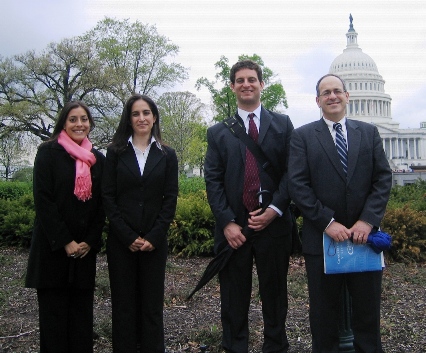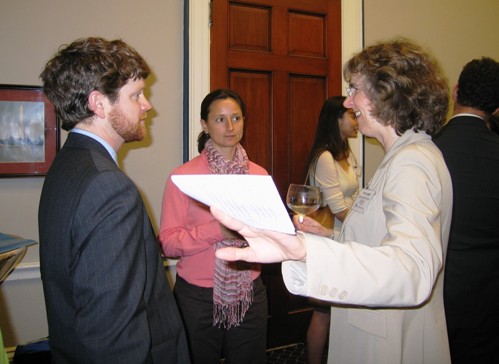The Ecologists go to Washington

ESA member Anna Stewart (SUNY-ESF), ESA Policy Award winners Jennifer Moslemi (Cornell) and Ari Novy (Rutgers), and ESA member Peter Groffman (The Cary Institute) on their Capitol Hill visits.
With massive issues like invasive species, climate change and protection of biodiversity moving onto the world stage, ecological knowledge has perhaps never been in higher demand than today. Support for most (about 67 percent) of biological research in the U.S. comes from the National Science Foundation’s Biological Sciences Directorate (affectionately known as NSF BIO); a similar granting program at the USDA, the Agriculture and Food Research Initiative (successor to the National Research Initiative), funds research in the agricultural sciences. However, funding to both of these directorates has been stagnant for nearly ten years, creating fierce competition for grants: NSF BIO currently rejects 85 percent of grant proposals it receives.

ESA Policy Award winners Colin Quinn (Colorado State) and Tanya Skurski (Montana State) get the lowdown on Congressional visits from ESA Public Affairs Director Nadine Lymn.
In response, more than 30 agricultural and biological scientists put on their policy caps this week to advocate for increased and sustained federal funding to these agencies. The researchers descended upon Washington D.C. from 21 different states, were given a crash course in the federal budgets, got to know one another, and finally set off in groups to the offices of their Congressmen. Their message was clear: Investment in the sciences is an investment in the country’s future.
ESA’s invited scientists were the four recipients of the ESA Graduate Student Policy Award (pictured), along with Scott Collins of the University of New Mexico. All met with staff members in their home state Congressional offices, giving examples of their own and other research projects that benefit constituents in a variety of ways, such as providing jobs, enhancing agriculture, increasing environmental protection and advancing education.
The event was sponsored by the Biological Ecological Sciences Coalition (BESC, of which ESA is a part) and the Coalition on Funding Agricultural Research Missions (CoFARM).